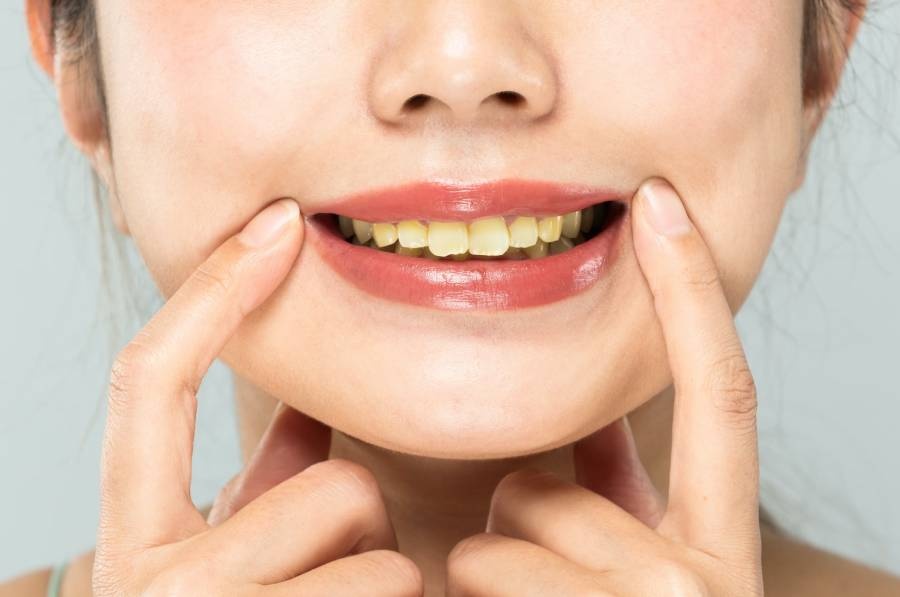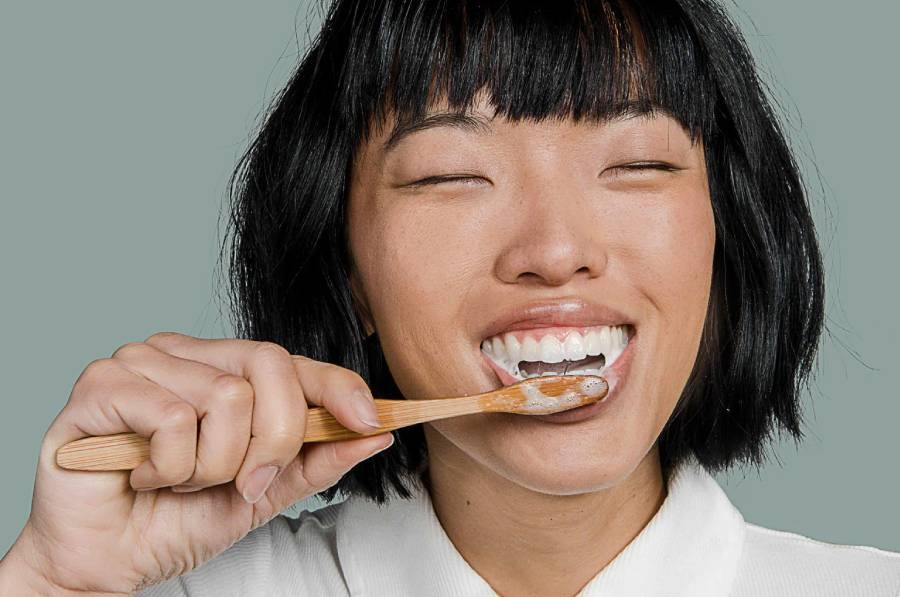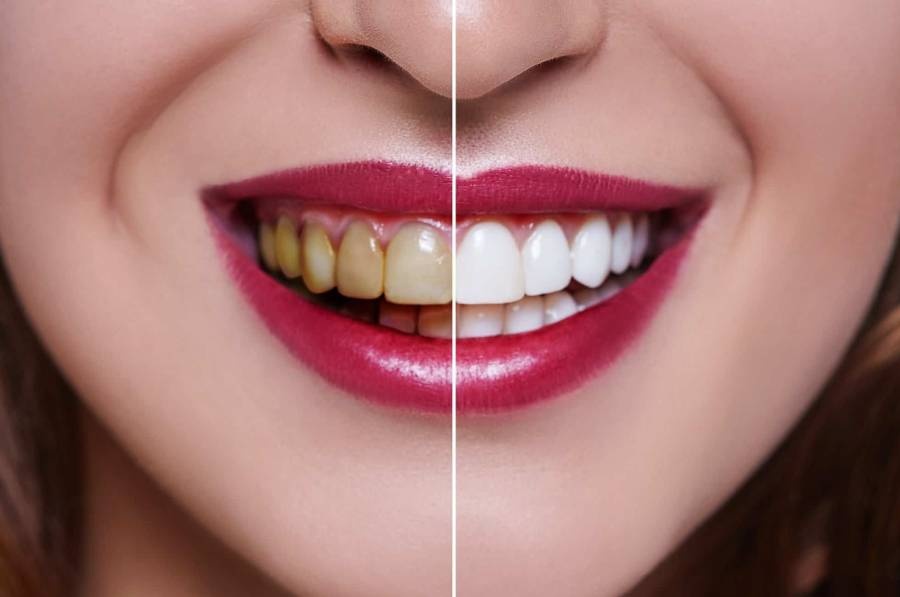Head Office
Sinan Mah. 1254 Sok. No:1/502 Muratpasa/Antalya/TURKEY

There is a common misconception that teeth are white. Teeth are naturally a bit yellow, not white. However, this doesn’t mean that they don’t become more yellow overtime or there aren’t factors causing it. Teeth can become even more yellow with age, excessive consumption of certain foods and beverages etc.
You might be asking yourself ‘how to get rid of yellow teeth’, so we listed some possible solutions below, but don’t forget that the best results are achieved with the help of your dentist, and home remedies can do more damage than good.

The colour of our teeth can be influenced by what we consume, and several common factors contribute to yellow teeth. Berries with dark natural colours, such as blueberries and raspberries, can stain teeth. Rinsing your mouth with water after eating these fruits can help prevent the juices from sticking to and staining your teeth. Red wine is known for causing stains, but white wine, with its high acidity levels, can also lead to yellow stains. Ketchup, a sugary and dark condiment with potent spices, can also contribute to teeth staining over time. Fizzy drinks, in addition to their sugar content, often contain high acidity levels that contribute to teeth stains. Smoking and chewing tobacco can stain teeth and lead to other dental problems like gum disease.
Furthermore, trauma to teeth, whether in childhood or adulthood, can impact blood flow and damage nerves, causing teeth to appear darker. Yellow stains on teeth are a natural part of aging, as the outer layer of enamel wears away, exposing the yellow dentin beneath. Poor oral hygiene, including irregular brushing, lack of flossing, and infrequent dental visits, can lead to the accumulation of plaque and food stains on teeth, affecting their appearance negatively. Regular oral care routines, along with smart dietary choices, can help maintain not only the health but also the aesthetic appeal of your teeth.
There are many practices you can do to slow your teeth turning yellow. Brushing techniques, consuming calcium, and fibre-rich foods, avoiding staining foods, and avoiding tobacco are among these practices.

The most important step is brushing your teeth properly. Start by brushing your teeth more often and doing it the right way, like brushing it at 45-degree angle. It's crucial to brush, especially after eating foods and drinks that can make your teeth yellow. But don't rush to brush right after having acidic foods and drinks because brushing right away can remove more enamel and cause erosion.
Brush your teeth at least two times a day for 2 minutes each time. Make sure to reach all the nooks and crannies. Gently brush your teeth in a circular motion to protect your gums. Brush the inside, outside, and chewing surfaces of your teeth.
Using a whitening toothpaste can also help brighten your smile because these toothpastes have gentle abrasives that scrub the teeth to remove surface stains without being too harsh. Also consider using an electric toothbrush, as it might be more effective in removing surface stains and reaching certain spots.
To maintain strong enamel and achieve a whiter appearance, the British Nutrition Foundation recommends incorporating foods high in calcium into your diet.
Healthy enamel prevents the exposure of the underlying dentine layer, contributing to a brighter smile. Whether it's dairy products or non-dairy alternatives, foods rich in calcium supply the essential minerals your teeth need for robust enamel.

Foods like dark berries, red wine, coffee, and tea are known for making teeth lose their whiteness. Also, sauces with tomatoes and dishes with curry have strong colours that can slowly make your teeth change colour. By considering these staining foods and making sure to take good care of your teeth, you can help maintain the natural whiteness of your smile.
Smoking not only poses significant health risks but also emerges as a prominent factor in the discoloration of teeth. The tar and nicotine present in cigarettes can accumulate on the tooth surface, leading to yellow stains and discoloration over time. These effects are not only cosmetic but also indicative of the potential harm smoking can cause to oral health. By quitting smoking you not only take a step towards enhancing your overall well-being but also actively protect the natural colour of your teeth.

If you’ve tried these steps but the results remain the same, it might be time to consider teeth whitening treatments. If you want to make your yellow teeth whiter, the best way is to get a professional whitening treatment from your dentist. This treatment is popular because you can see results in just one or a few visits, and the effects last longer than products you can buy in stores.
Your dentist might also suggest an at-home whitening kit, which usually includes a custom tray and whitening gel. You wear the tray for a specific time in the evenings, usually over one or two weeks.
While getting a whitening treatment from your dentist is usually more expensive than buying whitening products at the store, there are many options you can try. Whitening strips, mouthwashes, toothpaste, and pens are available over the counter. These products have a lower amount of whitening ingredients, so they may not be as effective, but they can still help make your teeth somewhat whiter.
Another option might be getting veneers. While dental veneers can help with a brighter smile and confidence boost, they also help protect your teeth and promote overall dental health.
For example, porcelain veneers are a great and popular choice for transforming the appearance of your teeth and smile. They are incredibly thin, minimizing alterations to your natural teeth. With a remarkably natural appearance, they blend seamlessly with your smile. With proper care, they can last up to 15 years.
Don’t forget to consult to your dentist to determine the causes and the best possible treatment for you.